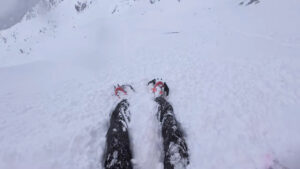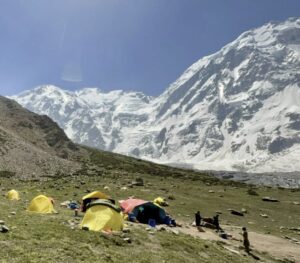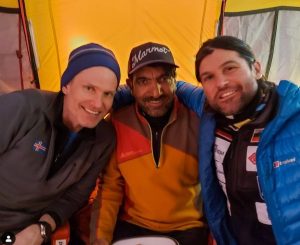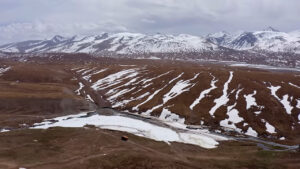“A game of life and death.”
“Something that will live in my soul forever.”
“I try to live my dreams.”
K2 and the Invisible Footmen wastes no time leaping into mountain-sport platitudes. But there’s a dark underbelly to this, and the film bares it almost right away.
A laden Pakistani porter on his way to base camp at Pakistan’s most famous peak cuts in.
“The people who don’t care,” he says, “make us carry 30-35 kilograms” (translated). He shakes his head slightly and glances aside. “The ones who do care make us carry up to 22-24kg.”
It’s important to remember that all realities exist at once. In one of them, men work themselves to the bone so others can stand on top of mountains.

A porter holds up his personal radio. Photo: Screenshot
Inequities between people who go on paid expeditions and people who make them possible run as deep as the industry. It’s a microcosm of a human arrangement that collars the planet and inflicts wounds that have nothing to do with mountaineering.
However, that’s not true if your economic world is contained within mountaineering. That’s the case for many Pakistani K2 porters, who generally earn a pittance compared to international guides but show up for work nonetheless.
Paltry wages
Earnings for a low-altitude porter (one who stays below the highest of the peak’s five camps) can be paltry: $55 has been reported as a three-week rate. To make things worse, there’s no reliable rate for porters — only pack weight and altitude limits. Nepali Sherpas and western guides also crowd the K2 market, and are reportedly well-compensated.
Without seismic change, there’s no indication the Pakistanis’ situation will improve. Developing new skills is a venture for either the bold or the reckless. Equipment is prohibitively expensive and training is inaccessible.
“We come here every year,” one aging Pakistani man says in the film. “We don’t have any other choice. Our helplessness brings us here.”
They filter in for the season from all over Pakistan, but some call the Karakoram home — like Muhammad Hassan of the Shigar District.

Muhammad Hassan. Photo: Adventure Alpine Guides
Last year on K2
Hassan became the icon of a movement to improve the lives of K2 porters, but not until he lost his own. Hassan died near the K2 summit on July 27, 2023 in an incident that quickly became a bone of contention. Climbers and guide staff variously reported Hassan sustained an injury that immobilized him, then died while summit-bound teams jumped over him on their way up.
Invisible Footmen constructs a world where such callous behavior seems feasible. Money rules everything in front of the lens, and men seem as desperate to capture it as they are jaded toward it.
The film is not void of joy, but don’t expect a romp. This is a world with caustic and deeply entrenched problems, and Invisible Footmen concerns itself with depicting it.
Hassan’s story shocked a faction of the mountaineering community awake. It prompted a government investigation, led to a two-year ban on the company Hassan worked for, and stimulated funding for his surviving family via crowdsourcing.
A year later, lasting change still seems diffuse. The K2 season is primed for takeoff — time will tell if wages for Pakistani porters continue to gutter.






